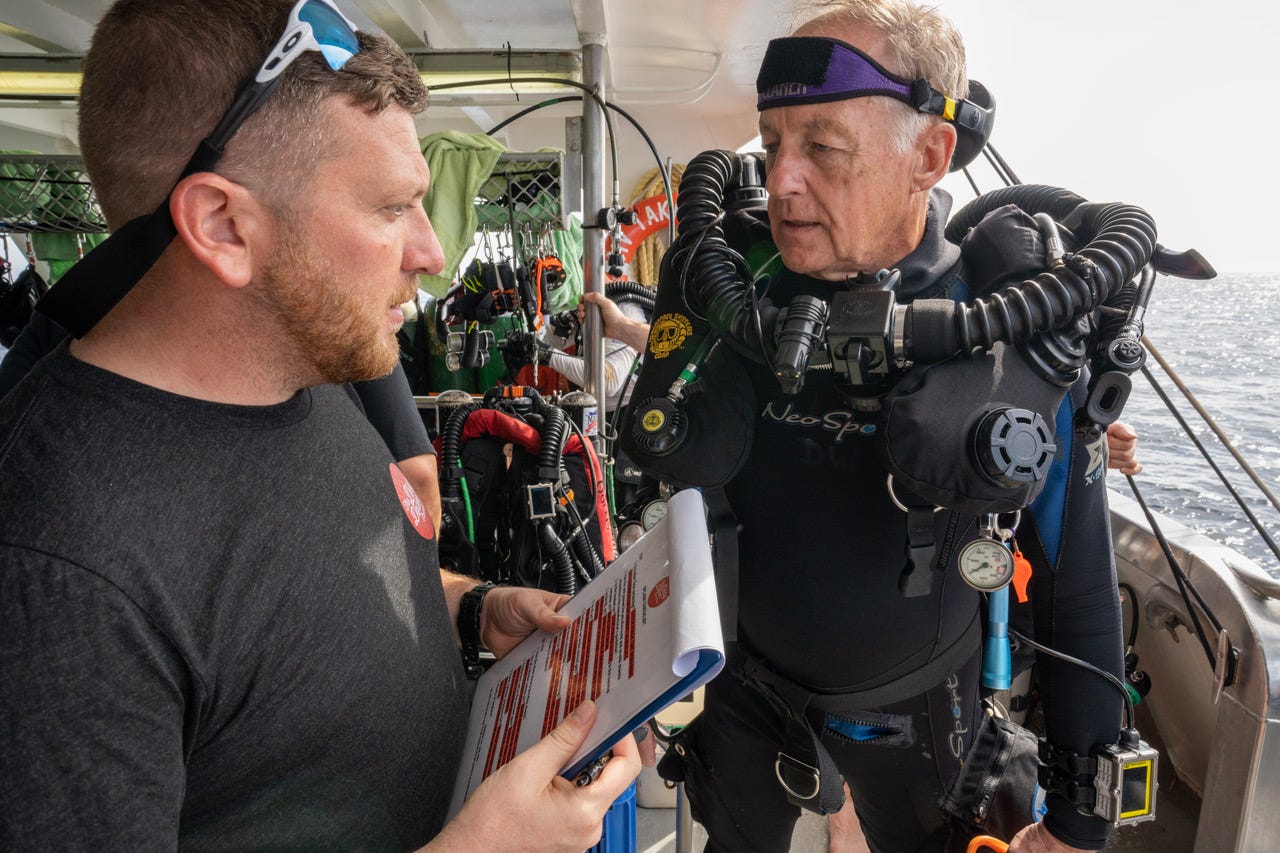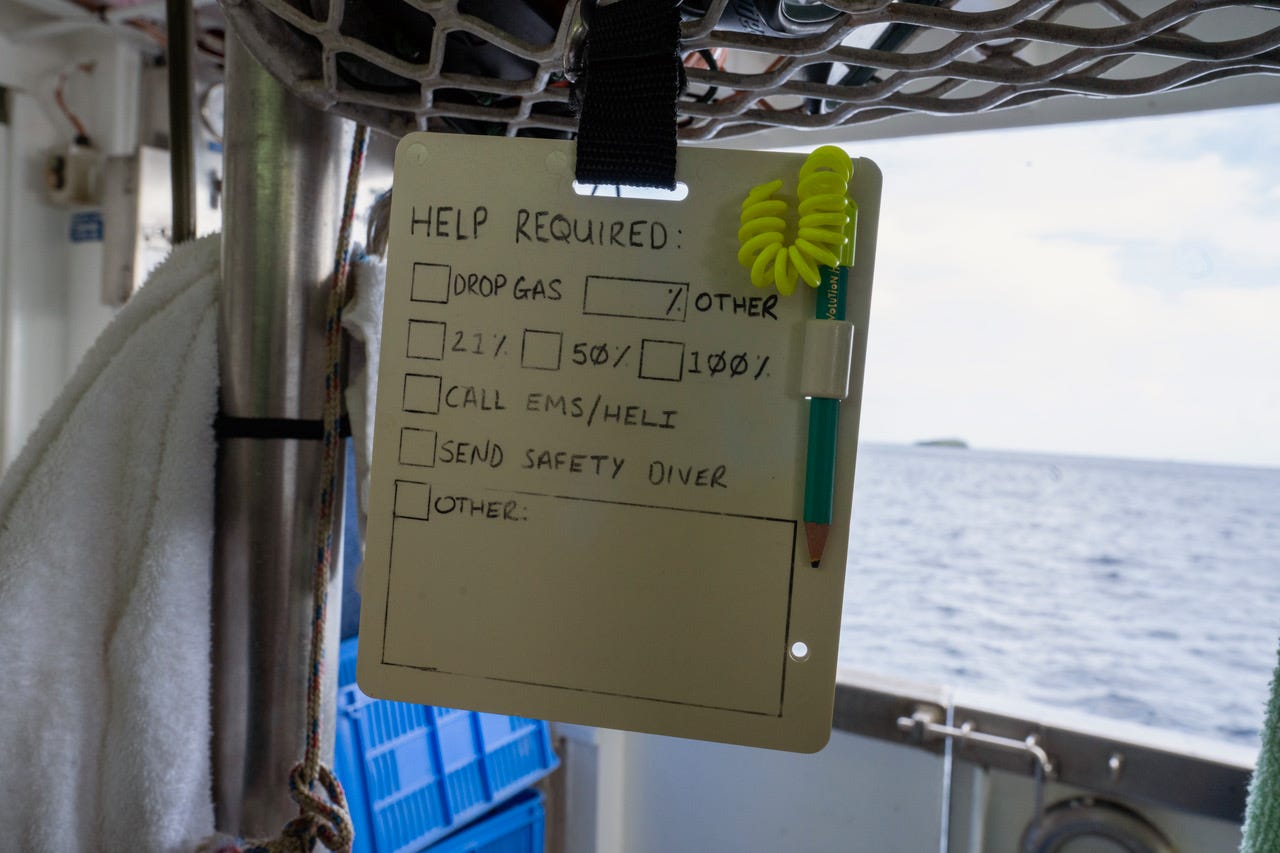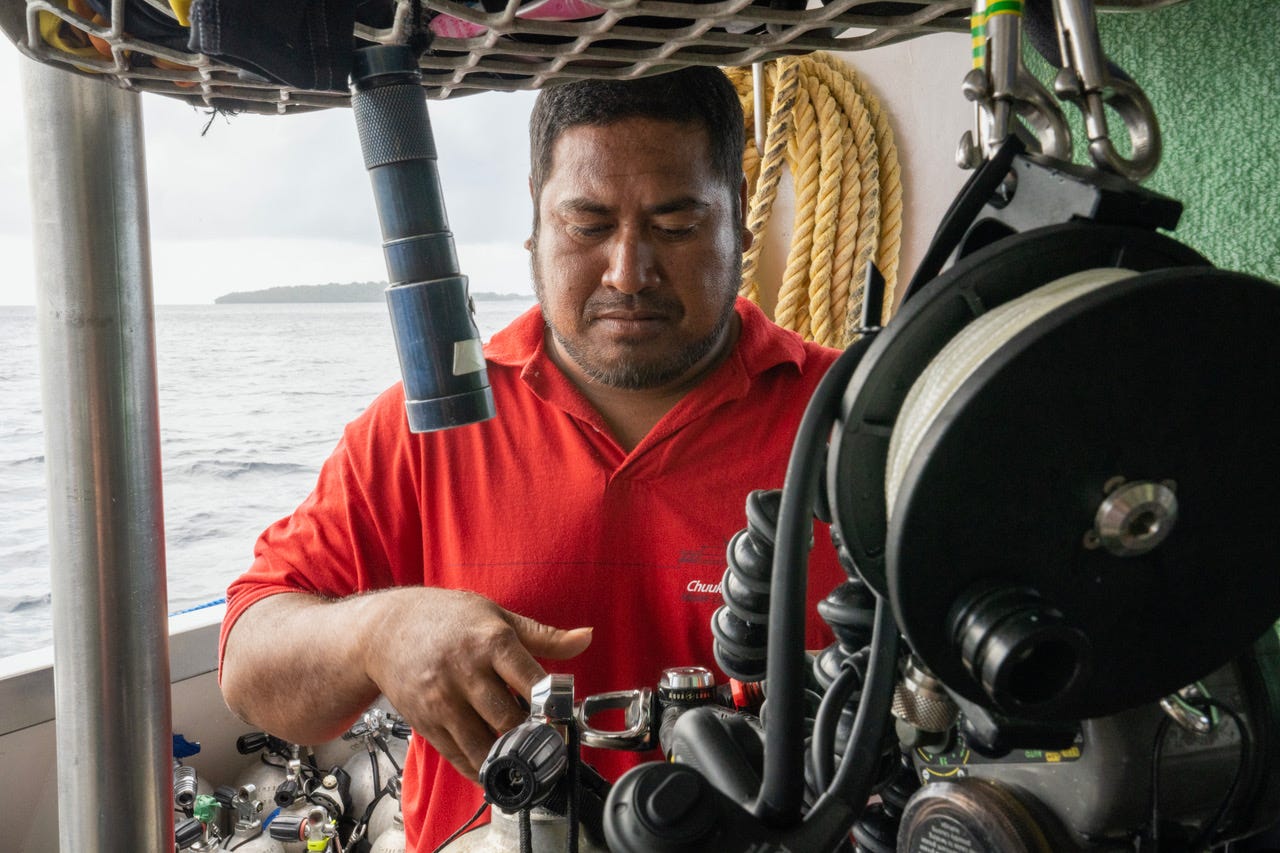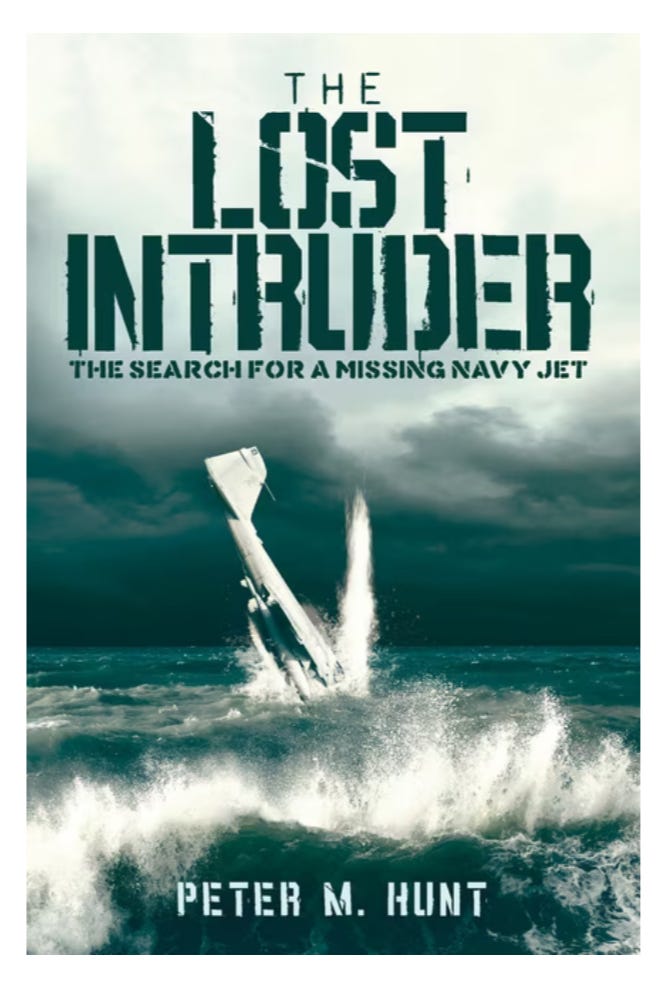Lesser Known Tips for Your Live-Aboard Dive Trip
A live-aboard dive trip is an incredible adventure—days filled with diving, camaraderie, and opportunities to encounter unique marine life. But it requires careful planning to ensure safety, comfort, and peace of mind. From packing the right gear to understanding emergency protocols, good preparation makes all the difference. Here are 15 lesser-known tips to help you prepare for life at sea so you can focus on what really matters: enjoying the dives.
Above: Last week I was diving the WWII wrecks of Truk Lagoon
Insurance: Diving, Medical, and Evacuation
Diving medical insurance is essential—organizations like Divers Alert Network (DAN) or DiveAssure cover recompression therapy, which standard insurance might not. Also consider travel medical insurance, as well as evacuation and rescue coverage. If you're seriously injured, you may need an air ambulance home. Look for policies that also cover a partner or companion to accompany you during repatriation.
Pack Light—and Smart
Pack as lightly as possible. Consider leaving gently used clothes behind for local crew or communities. Bring a lightweight dry bag for “boat laundry”—add biodegradable soap, water, and let the boat’s motion agitate it while you dive. Rinse and hang to dry after a good soak.
First Aid Essentials
While boats carry first aid kits, you should bring your own. Stock it with antibiotic cream, dressings/Band Aids, oral antibiotics, anti-diarrhea pills, pain relievers, anti-inflammatories, cold/flu medicine, seasickness pills, antibiotic ear drops, and reef-safe sunscreen (avoid sprays). Depending on your destination, you may also need insect repellent. Bring extra face masks so you can protect yourself if someone onboard is ill.
Medical History and Medications
In an emergency, medical personnel will need to know your health history and current prescriptions. Prepare a clear list that includes the generic names of your medications, dosages, and reasons for use. Keep it simple and translate if necessary—especially for destinations where English is not the first language.
Protecting Dive Gear and Lost Luggage Tips
Dive gear is costly, so it’s smart to insure it—again, DAN is a good resource. Minimize risk by putting a tracker (like an AirTag) in your checked luggage. Mark your bags with bright tape and your destination’s airport code and take a photo of the packed bag. For example, for a trip to Chuuk, use bold tape marked “TKK” for easier identification.
Choosing the Right Bags: Hard vs. Soft
Airline baggage limits vary depending on your ticket class, so review those carefully before booking. Sometimes an upgrade increases your luggage allowance and enhances comfort. Once on board the vessel, your bag may be stored either on the boat or ashore. Soft-sided, collapsible luggage is often easier to stow on a boat and preferred over rigid cases. Small plastic “ammo cases” are light and can be put inside soft bags. They can protect delicate items like masks in transit and provide waterproof storage and safety for items once onboard.
Footwear: Onboard and Onshore
Flip flops or shower shoes are perfect for life aboard, but don’t forget sturdy shoes for land excursions, hikes, or cultural visits. Check that your clothing choices are culturally appropriate. Bare legs or uncovered arms may be frowned upon in some places.
Fire Safety and Charging Devices
Never, ever charge electronics in your cabin and especially below the water line. Every dive vessel will have a designated charging area that’s monitored by crew—especially overnight while guests are sleeping. The best charging setups include safety features like smoke or heat detectors, automatic fire suppression systems, or cutoff circuits. Use only manufacturer-approved chargers and high-quality power strips. Always unplug devices and chargers when not in use.
Emergency Escape Plans
All liveaboards should conduct emergency drills, including muster station gatherings and abandon ship procedures. Take time to walk from your cabin to the deck using both primary and alternate escape routes—this might involve climbing a ladder or accessing a hatch. Make sure escape paths are clear and functional. Practice navigating in low visibility by counting steps and noting turns. It’s a small effort that could make a life-saving difference.
Drying Gear: Don’t Lose It to the Wind
Clothes pins or wide clamps are essential for drying gear securely on deck. Anything not properly fastened can easily blow away.
Hydration and Waste
Bring your own reusable water bottle and consider packing out your trash and dead batteries to ensure they’re properly recycled or disposed of once back on land.
Sleep Comfort
Shared sleeping quarters can be noisy or bright. Pack ear plugs and an eye mask to help you sleep. Audiobooks or relaxing soundscapes can also make a big difference. Pack a small headlamp so you can slip away to the bathroom without awakening others.
Communications
In the event of an emergency such as a boat fire, things happen fast. Ensure you understand how to make an emergency call with a smart phone or a device such as InReach. When using specific devices such as GPS trackers, check to see if they are legal at your destination. In some countries, carrying a device such as an InReach could land you in jail. Make sure your family has a list with your specific itinerary, destinations, emergency vessel contact numbers and local consular services and let them know whether internet communication will be possible when you are at sea.
Dive Smart—Not Just Hard
Some boats encourage challenges like the “Iron Diver” award for completing every single dive. But safety and health come first. Listen to your body, and don’t hesitate to sit out a dive if you're tired, unwell, or simply need a break. Avoid the “vacation mindset” where you erroneously let normal safety slip. No dive is an easy dive.
Tipping and Crew Appreciation
Plan to tip in cash—this ensures it reaches the crew directly without deductions. You can also show appreciation by gifting useful dive gear. In many locations, quality gear is expensive or difficult for crew members to replace.
You have invested a lot to be on the trip of a lifetime. Advanced planning will ensure that your trip is safe, enjoyable and filled with memorable experiences.
Jill narrates the audio book “The Lost Intruder” by Tech Diver and Naval Aviator Peter Hunt. Here’s chapter seven:
You can explore Peter Hunt’s books HERE.
Robert’s Perfect Song
Beginning with last week’s newsletter I introduced a new feature: A Perfect Song with Kate Bush’s iconic “Running Up That Hill”. This week, we’ll cross the Atlantic and check in with American new wave band The Talking Heads and their 1979 classic “Life During Wartime”. The song was the first single from their album “Fear Of Music” which was produced by electronic music pioneer Brian Eno. The full title of the song is “Life During Wartime (This Ain't No Party... This Ain't No Disco... This Ain't No Foolin' Around)", making it one of the longest popular song titles in history. As I revisited this song during the past week, it just resonated with the current uneasiness and multiple conflicts in our current world. “Life During Wartime” features prominently in the Talking Heads’ 1989 concert film “Stop Making Sense”, as the band’s front man David Byrne leads the players and back up singers in what seems like an aerobic exercise class, manically jogging around the stage and giving one of the most memorable live performances in rock history. Here’s a video sample…buckle up!
I describe the song as an apocalyptic merging of punk and funk. (That’s Parliament Funkadelic founder Bernie Worrell, Jr. playing keyboards in the video!) The lyrics describe a hellscape environment where a revolutionary hides out in a deserted cemetery, surviving on peanut butter and planning more clandestine action in U.S. cities like Houston, Detroit, and Pittsburgh. (I know, not exactly a common subject for a perfect song!)
Heard of a van that is loaded with weapons
Packed up and ready to go
Heard of some grave sites out by the highway
A place where nobody knows
The sound of gunfire off in the distance
I'm getting used to it now
Lived in a brownstone, lived in a ghetto
I've lived all over this town…
One of the earliest concerts I went to was Talking Heads, playing in a grungy punk club on South Street in Philadelphia. This was before their international success and fame. I remember the club being hot, sweaty, and uncomfortably crowded, with a sticky mixture of sawdust and spilled beer on the floor. There may have been 150 people crammed into this skinny venue with the band relegated to a set of six-inch wooden risers in a tight corner that served as a poorly-lit makeshift stage. I bought a demo cassette from the band that night - which began my 40+ year journey as a fan of The Talking Heads!
I will always encourage our readers to share their music, films, books, and other analog tributes of their formative popular culture with today’s young people. I have introduced Talking Heads to several people in their 20’s, and almost every one was just blown away! (Except the “Swifties”, bless their adorable hearts!) As always, your comments are welcome…
This newsletter is 100% organic - no algorithms, chatbots, or artificial sweeteners - just original thoughts and stories from cave diver/explorer Jill Heinerth and guy with too much music trivia in his head, Robert McClellan. Please share and enjoy!









Great comment Luca! These are excellent reflections from your experience. It is another long story, but I was once on damaged vessel, and we all put on dry suits with our ID inside our suits. It was sobering... I think that COVID may have set back some operators years in terms of repairs and upkeep. Your recommendation to research your travel provider is so important!
Awesome tip list! A few things I had to learn the hard way, specially overpacking! As nurses, very well stocked medical kit has come in handy on every single trip! We even ended up treating the captain in the Red Sea. That was during a crossing and because of that experience I would add, make sure that there is someone else in the crew that can pilot the boat. Our captain, 26 years old, had to pilot injured because there was no one else in the crew to do it! That lead to a couple of sleepless nights for my wife and I checking on him, making sure he was getting better, for his own sake of course but also all of us on board! I asked him, what happens if you can’t do it, he said they were going to radio on land for a new one. I didn’t ask how he would get on board and I just pretended it would be a helicopter. Also diving with a reputable company is the most important to me. I physically check the escape routes, make sure I can open them and there is nothing blocking them. Specially if my cabin is below the water line. I have a very little dry bag, where I have my phone, passport, important meds and a credit card, that goes with me everywhere but the dive and in the cabin is hanging right by the door when we are sleeping.